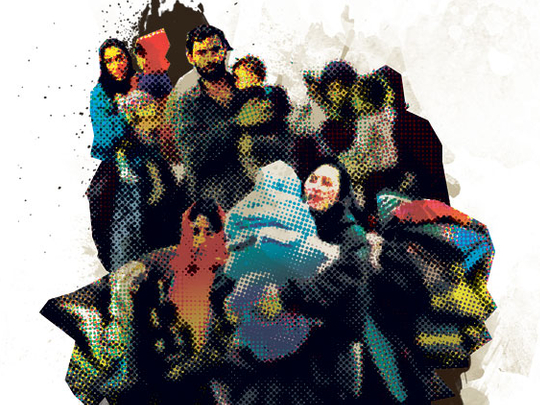
It is not yet a broad national debate, but more Jordanians are becoming vocal about the future of their country, and national identity, as a result of the failed peace process between Israel and the Palestinians. They warn of a conspiracy to turn the Hashemite Kingdom into a de facto Palestinian state through the naturalisation of hundreds of thousands of refugees; making Jordan the final destination for millions of West Bankers who increasingly face the threat of deportation or transfer by their occupiers.
The argument is not new. For years conservative figures among East Bank Jordanians have touted the dangers of settling Palestinian refugees permanently in Jordan as part of a regional peace deal that effectively wipes out the right of return. In a country where Jordanians of Palestinian origin, both citizens and refugees, make up a sizeable majority, such a possibility, in the view of opponents, will dilute the Jordanian national identity and hand over the country to the Palestinians.
But the argument does not stop there. It goes on to say that Israel's ultimate goal is to turn Jordan into a Palestinian state. It is a proposal that was first introduced by right-wing Israeli leaders back in the 1970s. It continues to resonate until today, despite the fact that one of Jordan's main claims after signing a peace treaty with Israel in 1994 was that the "Jordan-is-Palestine" doctrine has been buried forever.
Officially, Jordan flatly rejects schemes promoting Jordan as "an alternative homeland" for the Palestinians. King Abdullah II has reiterated, on more than one occasion, that Jordan will never replace Palestine nor will it be a party to attempts to deny refugees their right to return to their native land.
While such statements helped to appease critics for a while, lack of faith in the credibility of the peace process and a recent military edict that threatens to evict over 70,000 Palestinians, if not more, deemed to be residing illegally in the West Bank, have driven more East Bankers to express fears about the future of Jordan.
Last week the National Committee of Retired Military in Jordan, representing over 140,000 veterans, issued a strongly-worded communiqué directed to "honourable Jordanians" in which it warned against actual implementation of a Zionist project to liquidate the Palestinian cause at Jordan's expense. It warned that Jordan is coming under international pressure to "naturalise" millions of Palestinian refugees, including Gazans, thus giving them political rights and a quota in the political system equal to their numbers, which effectively fulfils the goal of creating an alternative homeland for the Palestinians.
The veterans called for political and legal reforms, among which was to make the administrative and legal disengagement decision from the West Bank of 1988 into law and incorporate the separation of the two banks into the Constitution. It also called on the government to support the military and adopt a defensive strategy that includes acquiring long-range missiles and forming a popular army to face Israeli threats.
Politically both the Palestinian National Authority and its rival in Gaza, Hamas, reject Israeli attempts to carry out a massive transfer of West Bankers, deny refugees their inalienable rights or target Jordan as an alternative homeland.
Suspicion
As Jordan prepares for parliamentary elections in November, under a new election law, fears and suspicions are rising. The government has been secretive about the nature of amendments it wants to introduce to the new law which, in the view of many, will provide clues about the direction that the kingdom will take on vital issues, including the sensitive subject of political quotas, the demographic make-up of the next House of Deputies, gerrymandering and electoral districts.
Political reform has so far taken a serpentine path, with most Jordanians believing it had failed to materialise. In the absence of a clear end-point for the peace process, Jordan has had to postpone, reverse or shelve plans to carry out bold reforms. Today it finds itself in a bind. As calls for clear action on the status of Palestinians in Jordan become vociferous, tension and uncertainty are on the rise. There is no easy way out, as the government has sustained international criticism over accusations that it was stripping Jordanians of Palestinian origin of their citizenships in an arbitrary and unconstitutional manner. Internally the pressure to continue with these procedures is mounting.
At one point the debate will have to be broadened and institutionalised in order to alleviate frustration and avoid national friction. But such a debate could incorporate issues that the government would be loath to address at this time, such as the viability of the peace treaty with Israel, controversial constitutional reforms and the future of Palestinians in Jordan, among others.
With mounting economic challenges and an obscure political road map, the government finds itself staving off threats on many fronts. The coming months will prove decisive for Jordan, as well as the Palestinians. Both have shared an existential bond since the 1940s, and today both are in dire need of a just culmination to the Arab-Israel conflict.
- Osama Al Sharif is a veteran journalist and political commentator based in Amman.








